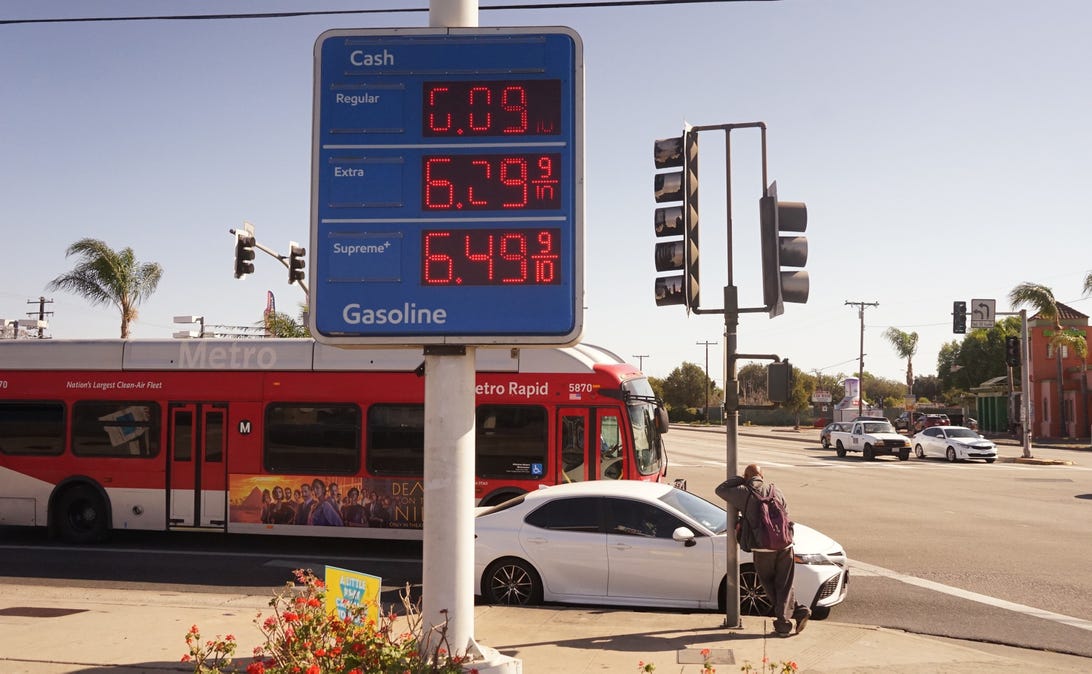With a gallon of gas averaging more than $5 a gallon all week, President Joe Biden pointed a finger at oil companies for worsening the situation with "historically high refinery profit margins."
In letters this week to the heads of Exxon Mobil, Chevron, Shell, Phillips 66, BP and other industry leaders, Biden wrote that Russia's invasion of Ukraine was one reason for rising costs at the pump.
"There is no question that Vladimir Putin is principally responsible for the intense financial pain the American people and their families are bearing," he said. "But amid a war that has raised gasoline prices more than $1.70 per gallon, historically high refinery profit margins are worsening that pain."
Read more: E85: Can Your Car Use the Cheaper Gas Alternative?
On Thursday, the national average was $5.01, according to the latest data from AAA. That's a 53-cent increase from last month and almost $2 more than a year ago, when the national average was just $3.07.
Even in Georgia, where gas is the cheapest in the country, a gallon of regular averages $4.50. California leads the nation at $6.43 a gallon.
Analysts predict even higher prices as we move further into summer: According to a May report by JPMorgan, the US average could surpass $6 a gallon by August.
Here's what you need to know about gasoline prices, including how high they could go, what the White House is doing to turn that around and how you can save money when you fill up.
Why is gas so expensive?
Russia's ongoing invasion of Ukraine is an obvious factor. The price of gas is inextricably linked to the cost of crude oil, from which it's refined. Every $10 increase in the cost of a barrel of crude adds almost 25 cents to the price of a gallon of gas.
According to the White House, the war has raised gasoline prices by more than $1.70 per gallon.
Even though the US doesn't import much crude from Russia, oil is traded on a global market and any change impacts prices all over the world.
Crude oil prices are nearly $120 a barrel, accounting for 60% of the price of a gallon of regular unleaded gasoline, according to April data from the Energy Information Administration.
The cost of crude could reach $150 a barrel, Foreign Policy reported earlier in June, as demand swiftly outpaces a global supply restricted by bans on Russian oil imports.

Los Angeles County saw the average price of self-serve regular gasoline pass $6 a gallon.
Zeng Hui/Getty ImagesTroy Vincent, a senior market analyst at energy analysis firm DTN, says the Russian invasion isn't the only factor.
Demand for gas plummeted during the pandemic, causing oil producers to put the brakes on production. Even though demand is nearing pre-pandemic levels, producers are still gun-shy about increasing production. In April, OPEC fell short of its targeted production increase by 2.7 million barrels a day.
"We've had a supply-and-demand imbalance for a while," Vincent told CNET. "And it will remain, regardless of whether this conflict goes away."
Biden has also accused oil companies of profiteering off the energy crisis.
"I understand that many factors contributed to the business decisions to reduce refinery capacity, which occurred before I took office," Biden wrote in his June 15 letter to industry leaders. "But at a time of war, refinery profit margins well above normal being passed directly onto American families are not acceptable."
In addition, in the summer months, gasoline is reformulated to prevent excess evaporation caused by higher temperatures outside. The more expensive summer blend of gasoline can add between 7 and 10 cents per gallon.
How high will gas prices go?
Tuesday's average of $5.02 a gallon is a record dollar amount, but adjusted for inflation it's still below the 2008 peak of $4.14, which would be about $5.37 now.
Still, experts don't believe we've seen the end of rising gas prices. Stores of domestic gasoline decreased by 800 trillion barrels last week, according to the EIA. Meanwhile, as the summer driving season continues, demand grew from 8.99 million to 9.2 million barrels a day.
"This dynamic between decreased supply and increased demand is contributing to rising prices at the pump," AAA said in a June 13 statement. "Coupled with increasing crude oil prices, this means that the price of gas will likely remain elevated for the near future."

Analysts predict gas in the US could soar to $7 a gallon if the barrel price continues to rise due to Russia's war in Ukraine.
Getty ImagesWith expectations of strong driving demand through Labor Day, JPMorgan analysts have predicted $6 a gallon nationwide before fall. Natasha Kaneva, JPMorgan's head of commodities research, said the price per gallon could jump to $6.20 per gallon as early as August, Insider reported.
Refineries typically increase production in spring in expectation of higher need in summer, Kaneva said. But gasoline inventories have actually fallen to their lowest seasonal levels since 2019.
What is the government doing to lower gas prices?
In the June 15 letter, Biden called on oil companies to work with his administration to address any reductions in production as well as "inventory, price, and refining capacity issues."
He previously criticized them for sitting on over 12 million acres of federal land approved for drilling and 9,000 production permits. The administration has indicated it wants oil companies to pay fines for letting leases go unused.
In April, the Environmental Protection Agency approved year-round sales of E15 gasoline, a cheaper fuel that contains 15% corn ethanol. The impact will be modest, as only about 2,500 of the more than 100,000 gas stations nationwide sell the higher-ethanol biofuel.
In March, the White House began releasing a million barrels of oil a day from the US Strategic Petroleum Reserve. The unprecedented withdrawal, expected to last for six months, could lower gasoline prices between 10 and 35 cents a gallon.
But insiders say it probably won't move the needle much in the long run. "It will lower the oil price a little and encourage more demand," Scott Sheffield, chief executive of Texas oil company Pioneer Natural Resources, told The New York Times in March. "But it is still a Band-Aid on a significant shortfall of supply."
The US is also looking at getting energy products from other sources: The Biden administration has been improving diplomatic relations with Venezuela, which has been banned from selling oil to the US since 2018, and is negotiating another nuclear nonproliferation treaty with Iran, which could bring Iranian oil back onto the market.
There's also a bill in Congress that would pause the federal fuel tax, though it faces stiff opposition. Individually, Connecticut, Maryland, New York, Florida and Georgia have suspended state gas taxes to help consumers, and at least 20 other states are considering similar moves.
How can drivers save at the gas station?
There's not much we can do to change the price of gas, but drivers can cut down on nonessential trips and shop around for the best price, even crossing state lines if convenient.
Apps like Gas Guru scan for the best gas prices in your region. Others, like FuelLog, track your car's gas mileage and can help determine if it's getting decent fuel economy. In addition, many gas station chains have loyalty programs, and credit cards have rewards programs that give cash back for gas purchases.
DTN's Vincent advises against hoarding gas or other extreme measures but encourages budgeting more for gas. High energy prices have been a major contributor to inflation for a while, he said, and won't be going away immediately.
"When the cost of crude rises, prices at the pump tend to reflect it very quickly," he said. "But gas prices tend to linger higher longer even when crude falls."
from "price" - Google News https://ift.tt/eUPslix
via IFTTT
No comments:
Post a Comment